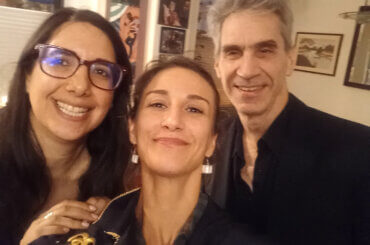| There’s just one day left in our campaign! We can unlock a $100,000 Can you donate now? Your gift today of $40, $75 or whatever amount you can manage will recognize and empower the superb reporting of those covering stories of change on the ground in Palestine. And of course, if you’ve already made a gift this month, please accept our thanks. |
I want to share with you two people who have become heroes of mine—and whom I was lucky enough to meet within the last year or so. One is the Palestinian artist and cartoonist Mohammed Sabaaneh. The other is U.S. Congresswoman Betty McCollum of St. Paul, MN. Two people of different generations, from different countries, in different walks of life: but they both inspire me through their work defying the Israeli system of detention and imprisonment.
Sabaaneh is an artist and cartoonist who was imprisoned for months by Israel for his work expressing political views. He is so much like people I know—another ink-stained wretch, to use the old journalistic expression. He’s young, bespectacled, with a merry sense of humor. But his work has been at once darkened and lifted up by his imprisonment. The trauma of solitary confinement informs Sabaaneh’s drawings and gives them dignity and compassion.
McCollum is a former teacher who has pushed pioneering legislation: a bill to stop Israel from using American dollars for its detention of children. She is committed because she has visited the occupation and knows what she saw is apartheid. How many public figures in the United States even dare to bear witness to the conditions that Palestinians have described? Although AIPAC has slandered her as a friend of terrorists, McCollum does not shy away from the issue. For me, her advocacy personifies the ideal of humble service.
There is no issue that makes the offenses of Israel’s regime more apparent than its treatment of prisoners. At Mondoweiss, we try to cover regularly Israel’s use of imprisonment and its wrenching conditions. We’ve reported on many Palestinians who have been imprisoned for the most ordinary political acts of resistance—making art or speaking out—such as Sabaaneh, the Palestinian legislator Khalida Jarrar and Abdallah Abu Rahma, one of the leaders of weekly protests in the village of Bil’in. And I hope you remember the stirring stories that the poet Dareen Tatour has written for us about her time in Israeli prison for writing poetry deemed a threat to the state.

If you haven’t donated yet this month, I ask today for your gift to help Mondoweiss continue covering Israel’s unfair political trials and conditions in its prisons. These stories are essential to building Palestinian solidarity and changing the image of Palestine in the United States. They demonstrate that Palestinian activists, intellectuals, and artists are very similar to those figures in our society, except that they have far fewer rights. Yet they carry on, with a physical and mental toughness I can only admire, and salute.

I know that I am not singling Israel out here. This issue has global application. And for me the issue of prisoners’ humanity has become personal: I’ve begun volunteering with a prisoners’ organization in the United States. Our criminal incarceration model deserves constant and loud protests for its cruelty and rigidity and racism.
And just as I’ve personally witnessed and admired the efforts of American prisoners to retain their humanity in impossible conditions, I am awed too by the ongoing resistance of Palestinian prisoners. Last spring a hunger strike by 400 Palestinian prisoners resulted in a real victory: access to pay phones three times a week to call loved ones. Helena Cobban celebrated that victory, and the prisoners’ bravery, in a Mondoweiss post. Winning a single battle, however, only creates the conditions for the next one: Israel later reneged on parts of that concession, leading to further hunger strikes.
Last month, Yousef Aljamal wrote for us about the death from cancer of Sami Abu Diak, 36, inside an Israeli prison. The cruelty of Israel’s denial of his last request—to be with his mother in his final days—boggles the mind.

My message to you today is a tribute to the strength and persistence of Palestinians and their allies everywhere. Those who protest, those who survive and those who die in prison deserve to have their stories told for the world to demand change. If you agree that it is our duty to shout these stories from the rooftops, I ask respectfully for your support of Mondoweiss’s journalism.
We will not rest, we will not abandon the responsibility of telling story after story, opening the world’s eyes to heartrending injustice. And if you join us in this effort, perhaps we can be worthy of their sacrifices. Thank you for whatever you can do, as a partner in our work.



https://ahtribune.com/world/north-africa-south-west-asia/palestine/3767-torture-of-detainees-in-israeli-jails.html
“Torture of Palestinian Detainees Prevails in Israeli Jails” American Herald Tribute, Dec. 29/19, by Romana Wadi.
“In comments to Al Jazeera regarding Israel’s use of torture against Palestinian detainees, Qadura Faris, head of the Palestinian Prisoner Society, declared: ‘The Israeli security wants to leave a mark on the psyche of those it detains: resistance has a price, and it is hefty.’
“Torture methods used by Israel include stress positions, beatings which result in severe injuries, sleep deprivation, emotional blackmail, threats of torture against family members of the detainees and the transfer of detainees to secret prisons. In one case reported by the Prisoner Support and Human Rights Association, Addameer: ‘The harsh beating was committed with the intention to kill the detainee.’
“Israel allows the use of torture in so-called exceptional cases and exempts the officials involved in torture from criminal responsibility. This ambiguity has contributed to a rampant use of torture against Palestinian detainees held in Israeli jails. Complaints to authorities have not yielded any results. Israel’s tactics of depriving legal counsel to tortured detainees during interrogation also hinders immediate recognition and awareness of such human rights violations as they occur.
“Addameer’s latest update on torture in Israeli jails, since August 2019, shows how Israel manipulates its so-called state of exception in order to circumvent the absolute prohibition of torture in international law. Israel’s security narrative – a commodity that has become part of mainstream rhetoric and adopted globally – provides the legal loophole within Israeli legislation to torture Palestinian detainees. Given that Palestinians, without exception, are all deemed a purported threat to Israel, there are no parameters excluding detainees from torture. On the contrary, rather than having their rights protected, Palestinians in Israeli jails risk additional violations while the perpetrators of such violence are immune from prosecution, by means of the same security narrative that allows for the torture of Palestinians.
“The recent update notes: ‘According to the Public Committee Against Torture in Israel (PCATI), about 1,200 complaints of torture during Israeli interrogations have been filed since 2001. All the cases were closed without a single indictment.’ Addameer also notes that torture is classified as a war crime – a pertinent point as Israel faces a possible investigation at the International Criminal Court (ICC).
“Interestingly, Addameer quotes a statement by Nils Melzer, the UN special rapporteur on torture, who draws comparisons in terms of occupation and torture, between the US presence in Guantanamo and Israel’s colonial entrenchment in Palestine. Both Israel and the US, he states, are setting an example of impunity when it comes to the torture of detainees.
“Since 1967, 73 Palestinian prisoners were killed by torture in Israeli jails. Torture survivors have no recourse to justice, as it is Israel who decides whether an investigation should be opened. Meanwhile, the international community continues to ignore such flagrant violations of human rights – war crimes, to use the current assertions levelled against Israel. Indeed, if the international community paid less importance to Israel’s security narrative, and concerned itself primarily with the violations justified through its purported right to defend itself, it is possible that there will be more cohesion regarding the legal importance of holding Israel accountable for its repression of the Palestinian people.”